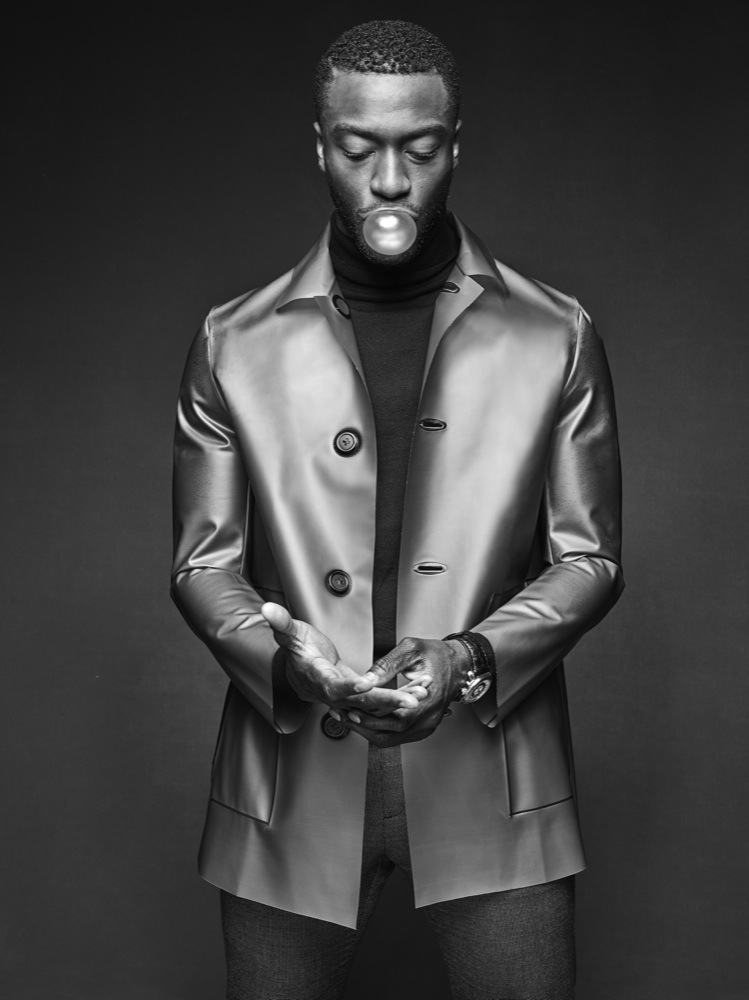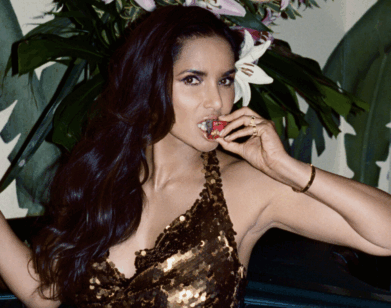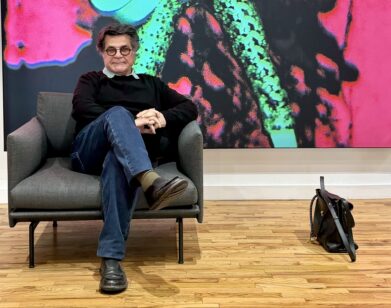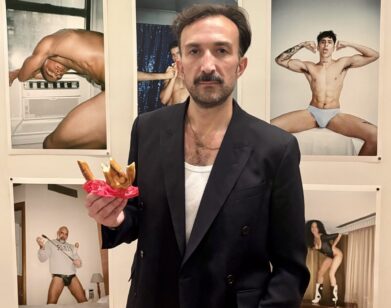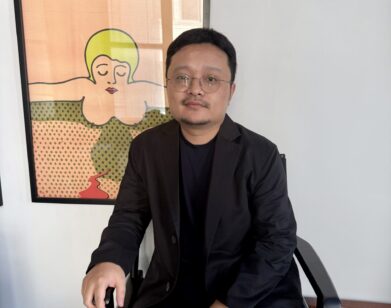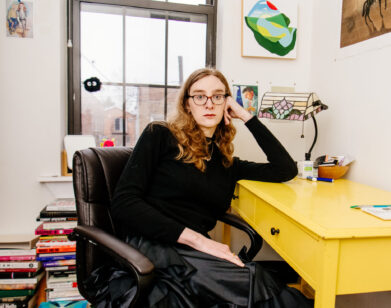Aldis Hodge Emerges from the Underground
ALDIS HODGE IN LOS ANGELES, JANUARY 2016. PHOTOS: DANI BRUBAKER. STYLING: DANI + EMMA. HAIR AND GROOMING: ANNA BERNABE/ART DEPARMENT USING KEVIN MURPHY HAIR CARE AND MURAD SKIN CARE.
Aldis Hodge is a man of many hobbies. When the North Carolina-born, New York- and New Jersey-raised actor isn’t working on television shows like Leverage, Turn, or Friday Night Lights (he played Ray “Vodoo” Tatum in the first season), or films like Straight Outta Compton (as N.W.A. member MC Ren), The East, and the forthcoming Jack Reacher sequel, Hodge makes his own watches. “Back when I was at ArtCenter [College of Design] 10 years ago, I was designing everything: cars, jets, motorcycles, houses,” he explains over the phone. “I’ve always known I wanted to be in design somehow. It was going to be architecture, but I would’ve had to quit acting for it,” he continues. “I realized with horology, I could learn at my own pace.”
In the near future, Hodge hopes to start his own watch line. “I’ve always wanted a company to be able to pass onto my kids, whenever I have them,” he says. “Watches, it’s a tough game. It takes time to make time, which a lot of people don’t realize. You can sit there and design a watch and develop it, but it may take two or three or 10 years to develop it properly.”
Now 29, Hodge started acting as a young child alongside his older brother Edwin. This year, however, is something of a breakout for Aldis; in addition to Jack Reacher: Never Go Back, the younger Hodge also stars in Underground, the new drama from WGN America premiering this week. Set in the Antebellum South, Underground follows the evolution of the Underground Railroad from multiple perspectives: runaway slaves on a Georgia plantation and the peers they leave behind, black and white abolitionists, and white slavery-supporting southerners, including a slave catcher struggling to provide for his young son (Christopher Meloni) and a plantation owner with roots in the more liberal North. Hodge’s character, Noah, is at the center of the narrative. Calm, confident, and a natural leader, it is Noah who convinces his fellow slaves—including the pretty house slave Rosalee (Jurnee Smollett-Bell) and self-serving overseer’s assistant Cato (Alano Miller)—to make a run for freedom. “I’ve been a slave all my life. Waiting to die, to live, or for a miracle,” Noah says. “I’m done waiting.”
EMMA BROWN: Obviously slavery is a very upsetting subject matter, and there are some very upsetting scenes in the show. Is it hard when you’re there, day after day, working 16-hour days?
HODGE: The time frame and how people treated each other was upsetting, but what’s great about this story is that they really focus on the strengths of these people and the strengths of the culture, of who these Americans were. That, actually, is uplifting. Even though the topic itself is the big, screaming elephant in the room, we still get a chance to have fun and enjoy what is on the screen, and we have moments where we’re actually happy.
It is a very serious subject—I don’t want to take away from that—but initially my assumption was that it was going to be super heavy and super dark. Granted we are a very gritty show—we are raw, we are real as it can get—but I didn’t realize that these people were strong enough to find moments where they can be happy and find moments when they can have fun and enjoy each other and laugh. That’s something that’s not really talked about, and it hasn’t really been shown too many times before in entertainment, and that’s something we get to explore here. They are people. Even though they were dealt a wrong hand, they made the best of it, and that’s where you really see the strength of who these people were.
BROWN: I grew up in England so I didn’t really know much about the Underground Railroad and how it started. Was that something you knew a lot about before signing onto the show?
HODGE: Unfortunately, no. They don’t really focus on that history here in America. I remember growing up as a kid, history class was very washed-over. They didn’t really get into the gritty bits of slavery. It’s a very, very small section in the history books. It’s not something they really touch on directly with American curriculums. [With the show,] we get to tell this story and people get to understand how important it actually is and was to the foundation of America’s economy.
BROWN: When you signed on, how much did they tell you about Noah’s arc?
HODGE: I knew nothing. I knew nothing past the first script. All I knew was this character devised a plan to run for freedom. I didn’t know if he would make it or not—honestly, I still don’t. To a degree, I didn’t want to know. I enjoy being surprised. They have it all locked down.
BROWN: Did they give you any books to read or films to watch?
HODGE: Oh, we were already deep into research. We, as a cast, were helping each other out a lot. Jurnee [Smollett-Bell] was reading a book, which she brought to us. Alano [Miller] was digging into the documentary series Many Rivers to Cross, which chronicles slavery from its conception to where it is today. Our creators Joe [Pokaski] and Misha [Green] spent a lot of time at the Library of Congress reading different memoirs that were written by actual enslaved people. We had a lot of real, raw resources to pull from, but we all helped each other compile these sources. We talked about it back and forth and discovered it all together.
BROWN: Did you know anyone involved with the show before you started filming? I know Jurnee was also on Friday Night Lights, but a little later in the series than you.
HODGE: Jurnee and I both started on the East Coast in New York as child actors. We met way, way back then, and then hadn’t really reconvened until now. I didn’t really know anyone going into it aside from [director] Anthony [Hemingway], who I’d met a couple times prior. Everybody was relatively new to one another. I’d known some of the other cast members’ work and I was a fan of them. I knew Adina Porter’s work, I knew Mykelti Williamson’s work, I knew Marc Blucas—he actually did a movie with my brother back in the day called The Alamo, so we knew each other from a couple years back.
BROWN: How did you start acting at such a young age?
HODGE: When my brother was a child, he kept telling my mom he wanted to be in the box. She didn’t get it—he was two or three years old and kept saying he wanted to be in the box. She finally realized he was talking about the television. We were living in Hawaii at the time at a Marine base, because both my parents were Marines at the time. They’ve since retired. My brother started first, and then there was a job for Ebony magazine. They were doing a photo shoot and my mom asked me if I wanted to be a part of it because they needed one more kid. I was three at the time, and I was like, “Nah, that’s not really my thing,” but she was like, “Look, if you do this one job, I’ll give you a Batman toy.” So I did it, I got my toy, and I kept doing it for toys. My brother was the one who got me into it. We worked for a good bit together—we did Sesame Street for a number of years, we did Showboat on Broadway for a number of years together, and we still every now and then cross paths. We’re trying to cross paths a little more often these days.
BROWN: I like that at three you knew, “That’s not really my thing.” It wasn’t just, “What’s acting?”
HODGE: It’s crazy how intelligent kids can be at a very young age and how they know what they know. I came out of the womb drawing on everything; I used to draw on my mother’s white furniture and her white walls with her red lipstick and my pencils. Little did she know that would later materialize into me doing what I do now—I’m a painter as well and a micromechanical engineer. Some of my job consists of me drafting and making technical drawings. So everything I did back then has materialized into something substantial for me today. Whatever kids are into, that might be their thing.
BROWN: Did you go to regular school?
HODGE: No I did not. I was in public school until third or fourth grade, and after that I was homeschooled. I was homeschooled until I was 14, and then when I was 14, I began attending college. Mom was not playing about that education. She always said, “Acting is a privilege not a priority. Education is the priority. If you’re not bringing home As and Bs, you can’t go on the audition.” We were serious about it. She made us earn it. My brother who was 15 at the time began attending college with me as well.
BROWN: Did you live on campus?
HODGE: No, I was too young to live on campus. I just went back and forth on the bus. Eventually I got my own car and thought I was Mr. Man, so I started hot wheelin’ it. I knocked around for the first couple years, knocking out the regular prerequisites, and then the last college I ended up at was ArtCenter College of Design [in Pasadena,] where I was going to major in architecture and product design. I had to stop that because of work. That’s when I booked Friday Night Lights. I had to travel to Texas, it was supposed to be two weeks and it ended up being a couple months and I lost out on my semester. I’ve pretty much been traveling and working ever since. I plan on going back and finishing one day, but regardless, I’m still making business out of it and enjoying every minute of it.
BROWN: Was Die Hard: With a Vengeance (1995) your first film?
HODGE: No, it wasn’t actually. I did a film prior to that called Bed of Roses with Christian Slater. Die Hard was a really awesome experience, but I was too young to understand what a big film it was. I was too young to understand who Sam[uel L.] Jackson was or who Bruce Willis was, who Jeremy Irons was at the time. All I knew was that they were good to me then. I remember my mom had a conversation with Sam Jackson about what she should do with our careers and what the next step should be; I was eight and my brother was nine. He said, “You need to get them on Broadway.” Coincidentally enough, right after we finished filming that we had an audition for the Broadway play Showboat. We thought it was a commercial. When we got there, my brother booked it first. We saw a six-month contract, and we were like, “What kind of commercial is this?” Eventually we realized what it was and my brother was on for about a year before I joined. I was on for the last year and a half of it. It was a really great experience. It was funny because Sam said, “Look, this is where they’re going to gain a foundation,” and he was absolutely right. I had the pleasure of running into Sam recently. We hadn’t seen each other in about 20 years, but he still remembered me and my brother.
BROWN: Have you and your brother ever gone out for the same roles?
HODGE: Oh, we do. Over the years. But we’re two very different actors, and in our house we’ve always practiced that you get what’s meant for you. Whenever he books a job, I’m proud of him, I’m happy for him, it was meant for him. I want him to succeed. I don’t feel like it’s a loss, because when one of us wins we all win. Same thing goes for me. My brother does a series of movies called The Purge, and they have the third one coming out this year, and then also he’ll be starring in the second season of Secrets and Lies. We want each other to win because we are a team, and this is how we’ve been since day one. That’s the end game for all of us in the Hodge house.
BROWN: Is it just the two of you or do you have other siblings too?
HODGE: We’ve got a little sister. She’s 10 years younger than me. She’s actually at UCLA right now in her third year—she’s 19 and in her third year. She’s in the medical field. At first she was studying neuroscience, [but] I think she switch to anthropology. She is the genius in the family. We’re just really proud to have her where she’s at.
BROWN: I know you’re doing the new Jack Reacher film. Can you tell me a little bit about that?
HODGE: I can’t tell you about the story, but I can tell you I had an amazing time on set. It was fun working with that whole camp. Tom is great, he’s a great leader on set, he treats everybody well. Working with our director Ed Zwick, he’s a legend in the game. It’s great to sit back and learn from him and be able to soak up his intuition because he knows exactly what he wants and he knows how to get it with a very tempered and respectful mannerism. He gives you confidence as an actor. That whole set was nothing but laughs. I was grateful to be around that energy. Regardless of the project, whenever you’re working on something, the best you can hope for is to be around good people, and I got exactly that. It makes everybody’s day easier. You go home happy, you go to work happy, you make a better project because everybody loves it and loves each other.
UNDERGROUND PREMIERES WEDNESDAY, MARCH 9, ON WGN AMERICA.

